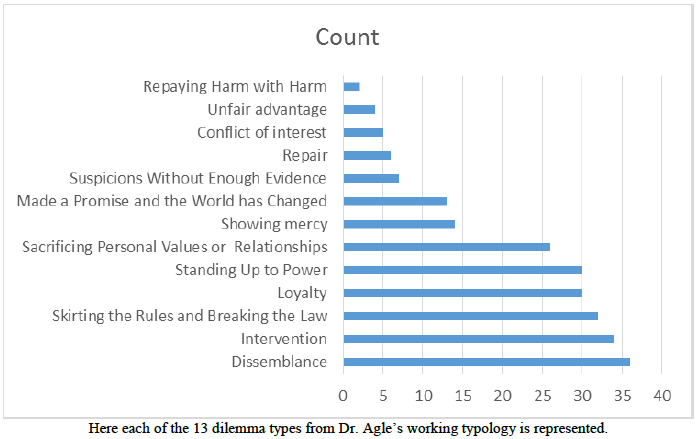Tyson Tharp and Dr. Brad Agle, Marriott School of Management
Introduction
The purpose of this project was to gain a deeper understanding of ethical dilemmas in an organizational context. From our increased understanding of these dilemmas, we hoped to offer guidance for practitioners and students of management that would help them to identify the major types of dilemmas they could expect to face, know when they could expect to face those dilemmas, and understand how to properly respond to those dilemmas. To help achieve this, a 13-category typology had already been created from a collection of data on dilemmas faced by MBA and EMBA students. This project was focused on performing a series of tests to ensure the accuracy and proper use of that typology.
Up to this point there are many general frameworks about how to approach ethics, but there is a need for a specific and practical approach to ethical decision-making. Two such approaches are in the extant literature (Cherrington & Cherrington, 1992; Kidder, 2005). However, there is a need for a more fine-grained approach. This research was aimed at providing that approach by outlining specific types of dilemmas (13) that businesspeople can expect to face during their career, and by providing detailed guidance for handling each. The significance of this work becomes clearer when one considers examples of poor ethical decision making in business.
Ford Pinto and General Motors vehicles provide examples of very similar ethical failures decades apart. Business leaders at Ford and General Motors ignored respective warnings about the fuel tank problems with the Pinto and ignition problems with multiple GM vehicles. Consequently, many people died. These leaders put healthy bottom lines in front of safety.
Enron is another commonly cited case of poor ethical reasoning in a corporate setting. In the case of Enron, business leaders destroyed many peoples’ financial lives because of their selfish choices. By categorizing the types of dilemmas one may face, and identifying when they are likely to face those dilemmas, we have helped combat poor ethical reasoning in business and society as a whole. The research can be applied in ethical coursework in business programs, especially here at BYU. These efforts may help prevent future tragedies from occurring again.
Academic Outcomes and Results
There were to major academic outcomes that were pursued and completed during the course of this project: performance of a 1) frequency count, and 2) content validity check. A number of dilemmas collected by Dr. Agle were reviewed by me for fit within the typology and count of occurrences within each of the categories within the typology.
Regarding frequency count, the following was found among the group of dilemmas reviewed by me alone. The chart below graphically depicts that among dilemmas I reviewed Dissemblance was the most frequent type of ethical dilemma faced as categorized by the typology:
Of course Intervention, Skirting the Rules and Breaking the Law, and Loyalty all seemed to have equally telling high frequencies of occurrence. This data will be tested going forward for inter-rater reliability, and certainly has many useful implications once further validated.
Regarding academic outcomes associated with content validity checks, my work showed favorability to the current suggested typology. There were almost no dilemmas that were reviewed which seemed to not fit into the typologies 13 categories. Of course, there are many other dilemmas to review on top of what I already have reviewed, but the work up to this point suggests that the typology may be complete.
This work will be useful to Dr. Agle going forward by providing some essential ground work for which some other major academic outcomes will be accomplished. Primarily the work completed can be useful in helping with the compilation of a practitioner’s manual for current and future businessmen.
Scholarly Sources
- Kidder, Rushworth, 2005. How Good People Make Tough Choices: Resolving the Dilemmas of Ethical Living, Institute for Global Ethics.
- Cherrington, J. Owen, and David J. Cherrington. “A menu of moral issues: One week in the life of The Wall Street Journal.” Journal of Business Ethics 11.4 (1992): 255-265.

